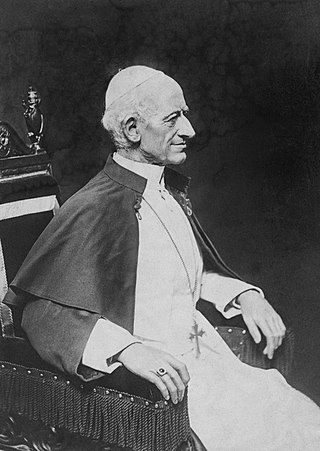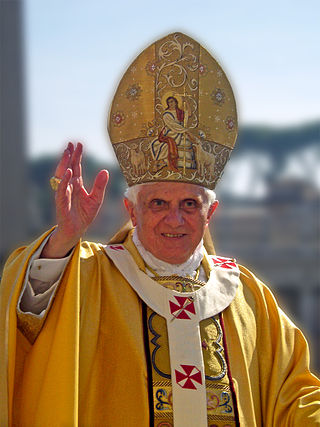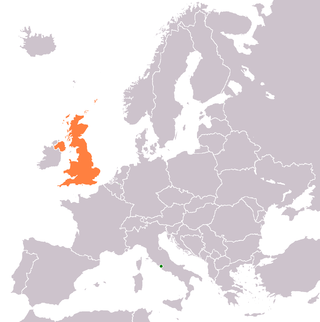
Humanae vitae is an encyclical written by Pope Paul VI and dated 25 July 1968. The text was issued at a Vatican press conference on 29 July. Subtitled On the Regulation of Birth, it re-affirmed the teaching of the Catholic Church regarding married love, responsible parenthood, and the rejection of artificial contraception. In formulating his teaching he explained why he did not accept the conclusions of the Pontifical Commission on Birth Control established by his predecessor, Pope John XXIII, a commission he himself had expanded.

Pope Pius VII was head of the Catholic Church and ruler of the Papal States from 14 March 1800 to his death in August 1823. Chiaramonti was also a monk of the Order of Saint Benedict in addition to being a well-known theologian and bishop.

Pope Benedict XV, born Giacomo Paolo Giovanni Battista della Chiesa, was head of the Catholic Church from 1914 until his death in January 1922. His pontificate was largely overshadowed by World War I and its political, social, and humanitarian consequences in Europe.

Pope Pius XI, born Ambrogio Damiano Achille Ratti, was the Bishop of Rome and supreme pontiff of the Catholic Church from 6 February 1922 to 10 February 1939. He also became the first sovereign of Vatican City upon its creation as an independent state on 11 February 1929 where he held that position in addition to being the earthly leader of the Catholic Church until his death in February 1939. He assumed as his papal motto "Pax Christi in Regno Christi", translated "The Peace of Christ in the Kingdom of Christ".

Rerum novarum, or Rights and Duties of Capital and Labor, is an encyclical issued by Pope Leo XIII on 15 May 1891. It is an open letter, passed to all Catholic patriarchs, primates, archbishops and bishops, that addressed the condition of the working classes.
Catholic social teaching (CST) is an area of Catholic doctrine which is concerned with human dignity and the common good in society. It addresses oppression, the role of the state, subsidiarity, social organization, social justice, and wealth distribution. CST's foundations are considered to have been laid by Pope Leo XIII's 1891 encyclical, Rerum novarum, which advocated distributism. Its roots can be traced to Catholic theologians such as Thomas Aquinas and Augustine of Hippo. CST is also derived from the Bible and cultures of the ancient Near East.
Pacem in terris is a papal encyclical issued by Pope John XXIII on 11 April 1963, on the rights and obligations of people and their states, as well as proper interstate relations. It emphasizes human dignity and human equality in endorsing women's rights, nuclear nonproliferation and the United Nations.
Humani generis redemptionem is an encyclical by Pope Benedict XV given at St. Peter's, Rome, on 15 June, the Feast of the Sacred Heart of Jesus in the year 1917, in the third of his Pontificate. The encyclical points to an ever-increasing number of Christian preachers and an ever-decreasing effect of their preaching. He admonished bishops to be preachers first of all, and to be more careful in the selection of preachers and confessors, for whom Humani generis redemptionem prescribed basic preconditions.

Deus caritas est, subtitled De Christiano Amore, is a 2005 encyclical, the first written by Pope Benedict XVI, in large part derived from writings by his late predecessor, Pope John Paul II. Its subject is love, as seen from a Christian perspective, and God's place within all love. Charity is one of the three theological virtues; and the other two were treated in two successive encyclicals, one signed by Benedict and one written substantially by him but signed by his successor Pope Francis . This text begins with a reflection on the forms of love known in Greek philosophy—eros, agape, philia (friendship)—and their relationship with the teachings of Jesus.

Oswald Gracias is an Indian cardinal of the Roman Catholic Church. He was appointed Latin Church Archbishop of Bombay by Pope Benedict XVI on 14 October 2006 and was raised to the cardinalate in 2007. In 2008, he became vice-president of the Conference of Catholic Bishops of India; and in 2010, he was elected president. He was also elected secretary general and then president of the Federation of Asian Bishops' Conferences from 2010 to 2019. On 13 April 2013, he was appointed to the eight-member Council of Cardinals, informally the Council of Cardinal Advisers, established by Pope Francis to help with governing the Catholic Church and reforming its central administration. He was mentioned as a possible candidate to succeed Pope Benedict XVI in 2013.
The Vatican Publishing House is a publisher established by the Holy See in 1926. It is responsible for publishing official documents of the Roman Catholic Church, including Papal bulls and encyclicals. On 27 June 2015, Pope Francis decreed that the Vatican Publishing House would eventually be incorporated into a newly established Secretariat for Communications in the Roman Curia.

The Mariology of the popes is the theological study of the influence that the popes have had on the development, formulation and transformation of the Roman Catholic Church's doctrines and devotions relating to the Blessed Virgin Mary.

Le pèlerinage de Lourdes is the only encyclical of Pope Pius XII issued in French. It includes warnings against materialism on the centenary of the apparitions at Lourdes. It was given at Rome, from St. Peter's Basilica, on the feast of the Visitation of the Most Holy Virgin, July 2, 1957, the nineteenth year of his pontificate.
Ad beatissimi Apostolorum is an encyclical of Pope Benedict XV given at St. Peter's, Rome, on the Feast of All Saints on November 1, 1914, in the first year of his pontificate. The first encyclical written by Pope Benedict XV coincided with the beginning of the First World War, which he labelled "the Suicide of Civilized Europe".
Maximum illud is an apostolic letter issued by Pope Benedict XV on 30 November 1919. As is traditional with such documents, it takes its title from the opening words of the original Latin text, meaning "that momentous". Benedict begins by recalling "that momentous and holy charge" found in Mark 16:15: "Go into the whole world and preach the gospel to all creation."

Holy See–United Kingdom relations are foreign relations between the Holy See and the United Kingdom.

Diplomatic relations between the Holy See and the State of Israel, as well as a concordat defining the status and fiscal and property rights of the Catholic Church and related entities within Israel. Formal diplomatic relations between the two states were established after the adoption of the Fundamental Agreement by the two States on 30 December 1993. A Vatican Nunciature in Israel and an Israeli embassy in Rome were simultaneously opened on 19 January 1994. From the Vatican's point of view, the establishment of diplomatic relations between the two states is part of the Christian–Jewish reconciliation; and from the Israeli point of view, the normalization of diplomatic relations. Prior to the establishment of diplomatic relations, the interests of the Catholic Church in Israel were looked after by the Apostolic Delegate to Jerusalem and Palestine, the Latin Patriarch of Jerusalem and the Custodian of the Holy Land, all of which continue to function.

The Holy See and the State of Palestine established formal diplomatic relations in 2015, through the mutual signing of the Comprehensive Agreement between the Holy See and the State of Palestine. In 2017, a Palestinian embassy to the Holy See was opened.

Caritas in veritate is the third and last encyclical of Pope Benedict XVI, and his first social encyclical. It was signed on 29 June 2009 and was published on 7 July 2009. It was initially published in Italian, English, French, German, Polish, Portuguese, and Spanish.

The relations between Pope Pius XII and Judaism have long been controversial, especially those questions that surround Pope Pius XII and the Holocaust. Other issues involve Pius's Jewish friendships and his attitude towards the new state of Israel.













